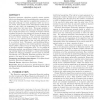21 search results - page 2 / 5 » Bounds on the Time to Reach Agreement in the Presence of Tim... |
PODC
2006
ACM
13 years 11 months ago
2006
ACM
Byzantine agreement algorithms typically assume implicit initial state consistency and synchronization among the correct nodes and then operate in coordinated rounds of informatio...
GLOBECOM
2007
IEEE
14 years 2 days ago
2007
IEEE
— In a wireless network (WN), the wireless devices generally localize themselves with the help of anchors that are pre-deployed in the network. Some of the techniques commonly us...
SPDP
1993
IEEE
13 years 10 months ago
1993
IEEE
This paper presents a solution to the (processor) group membership problem. The methodology followed in designing the algorithm is summarized by the option to optimize the perform...
ASYNC
2002
IEEE
13 years 10 months ago
2002
IEEE
This paper presents a novel variation of wave pipelining that we call “surfing.” In previous wave pipelined designs, timing uncertainty grows monotonically as events propagat...
STOC
2005
ACM
14 years 6 months ago
2005
ACM
A celebrated 1976 theorem of Aumann asserts that honest, rational Bayesian agents with common priors will never "agree to disagree": if their opinions about any topic ar...

